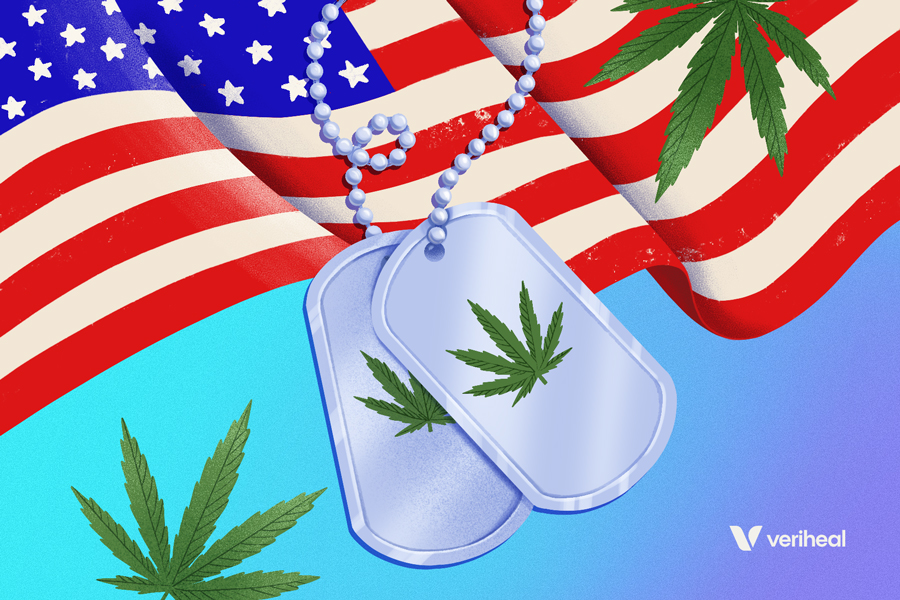Many states in the US have legalized cannabis, thirty-eight states to be exact. Despite the widespread adoption, the Food and Drug Administration still classifies cannabis as a Schedule One drug.
According to the United States Drug Enforcement Administration (DEA), Schedule One drugs are “drugs with no currently accepted medical use and a high potential for abuse.” Other substances like heroin and lysergic acid diethylamide also fall under this category. Simply put, in the eyes of federal law, cannabis is illegal.
The Department of Veterans Affairs (VA) falls under federal government control which means it must obey all federal laws, including every cannabis law. As such, VA healthcare providers cannot recommend medical cannabis or assist veterans in getting it.
Nonetheless, with the increasing legalization of medical cannabis, many veterans and interest groups have asked the government to change its policies.
Veterans And The Cannabis Cure
Many Veterans come back from their military service with a laundry list of physical and mental health issues. Common challenges that veterans face include chronic pain, PTSD, depression, insomnia, traumatic brain injury, broken bones, and musculoskeletal ailments.
When seeking help for these issues, healthcare providers often prescribe opioids to veterans. Unfortunately, opioids are incredibly addicting and have caused an increase in opioid overdoses among veterans. With the increasing decriminalization of medical cannabis, more and more military veterans have turned to the plant for help. Subsequently, many veterans have experienced a better quality of life as a result.
Is Medical Cannabis Legal?
According to Federal law, cannabis use is illegal. However, cannabidiol (CBD) and CBD products obtained from hemp plants with less than 0.3% tetrahydrocannabinol (THC) are legal. THC is the major ingredient responsible for the “highness” effect of cannabis.
Currently, thirty-eight US states and Washington, D.C. allow the use of medical cannabis. Additionally, seven US states allow the medical use of CBD oil. All that said, because of federal law, you can still get arrested for cannabis in these states.
>> Learn more: Where is Cannabis Legal?
Why You Should Get Your Medical Marijuana Card
Veriheal has satisfied millions of patients nationwide by giving them access to these benefits
- Larger purchase limits
- Peace of mind
- Enhanced legal protection
- Access to higher potency strains
- Save up to 25% on cannabis purchases
- Skip the line at the dispensary
Can Veterans Get Medical Marijuana Through the VA?
No, they can’t. Because cannabis is illegal according to federal laws, VA medical personnel cannot recommend or provide medical cannabis for veterans. VA facilities don’t even allow veterans to bring the substances into it’s buildings. Although the VA cannot pay for medical cannabis prescriptions for veterans, they can confidentially discuss its use with their veteran patients if it’ll help their condition.
Has the VA Put in Any Effort to Legalize Medical Cannabis For Veterans?
Yes, it has. The VA has supported legislation to allow VA scientists to conduct their research on cannabis, its benefits, its risks, and potential for abuse. Bills to reform medical cannabis for Veterans, like the Veterans Medical Marijuana Safe Harbor Act (S. 3409), the VA Medicinal Cannabis Research Act of 2018 (H.R. 5520), and the Veterans Equal Access Act (H.R. 1647) were all introduced in the 116th Congress but were not passed. However, it is clear that there is momentum to give veterans access to cannabis.
What is the Disabled American Veterans’ (DAV) Stance on Medical Cannabis?
The DAV supports legislation to approve medical cannabis for disabled veterans. In 2018, DAV members introduced the DAV Resolution 023 to encourage research efforts into the usefulness of cannabis in treating veterans who became disabled in service.
What Health Conditions Can Medical Cannabis Treat?
Medical cannabis is proven to treat several health conditions. Unfortunately, qualifying conditions for getting a medical card can vary on a state-by-state basis. Not to worry though, you can check your state’s qualifying conditions using the “Select Your State” drop-down menu on Veriheal. Here are the most common qualifying conditions:
Read more >> 5 Preferred Cannabis Strains for PTSD
Are There Other Benefits of Medical Cannabis?
Many believe that medical cannabis offers a solution to combat the harmful consequences of opioid abuse and addiction among veterans. The Department of Veterans Affairs has revealed that about 65% of veterans are more likely to die from opioid overdose than non-veterans. Alternative therapies to opioid treatment like medical cannabis will help the VA’s effort to deal with the opioid epidemic.
Is There a Penalty for Using Medical Cannabis?
No, there isn’t, as far as the VA is concerned. According to the DAV, veterans who are involved in the medical cannabis program in legalized states will still enjoy their VA benefits. However, there can be penalties based on federal laws.
For example, the Bureau of Alcohol, Tobacco, and Firearms has stated that “Any person who uses or is addicted to marijuana, regardless of whether his or her state has passed legislation authorizing marijuana for medicinal purposes is an unlawful user of or addicted to a controlled substance and is prohibited by Federal law from possessing firearms or ammunition.”
While some states are pushing for a 2nd amendment right for certified medical, it’s vital to be cautious because of the existing federal laws.
Author, Share & Comments
















